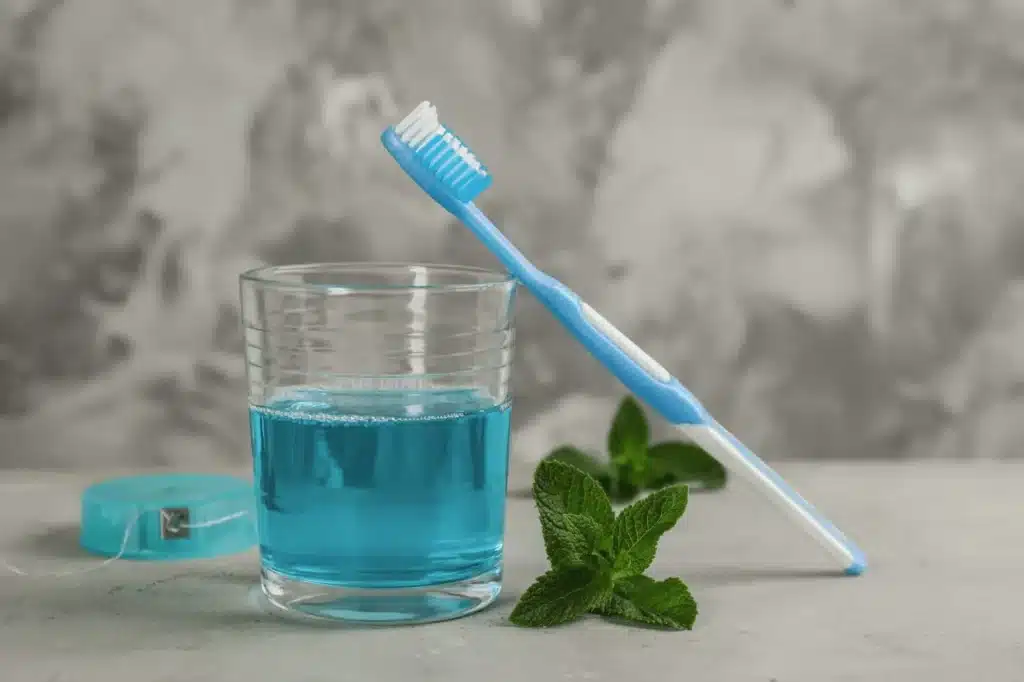People often have this question, Is mouthwash a cure for bad breath? Bad breath is actually a problem that can’t be ignored. But don’t worry. Read more about the effectiveness of mouthwashes and ways to eliminate your bad breath.
Causes of Bad Breath
The causes of bad breath, also known as halitosis, can include:
Bacteria: Oral bacteria produce sulfur compounds, leading to unpleasant odors.
Food Particles: Residue from certain foods can linger in the mouth and contribute to bad breath.
Dry Mouth: Reduced saliva flow can result in a dry oral environment that fosters bacterial growth.
Smoking and Tobacco: Tobacco products can lead to persistent bad breath.
Gum Disease: Periodontal diseases can release foul-smelling gases.
Medical Conditions: Some health issues like respiratory infections, diabetes, and liver disease can cause bad breath.
Medications: Certain medications may lead to dry mouth or produce sulfur compounds.
Diet: Pungent foods like garlic and onions can affect breath temporarily.
Types
When it comes to the question, Is mouthwash a cure for bad breath, one must look into the types of mouthwashes available and their specialties. There are two primary types: antiseptic mouthwashes and cosmetic mouthwashes. Let’s explore more.
Antiseptic Mouthwash
Antiseptic Mouthwashes are designed to combat the root cause of bad breath, bacteria. They contain active ingredients like chlorhexidine or cetylpyridinium chloride that kill or inhibit bacteria. This action can provide immediate relief from bad breath. However, they have their benefits and drawbacks.
Let’s look into the pros and cons of antiseptic mouthwash to know “Is mouthwash a cure for bad breath or not.”
Pros
- Effective at killing bacteria.
- Reduces the risk of gum disease.
- Provides immediate relief from bad breath.
Cons
- It may disrupt the natural balance of oral flora.
- Potential side effects like staining and altered taste perception.

Cosmetic Mouthwash
Cosmetic Mouthwashes offer a quick fix for bad breath without addressing its underlying causes. They often contain flavoring agents and mask odors temporarily. These mouthwashes are temporary solutions that provide a fresh feeling but do not target the root issues. They are suitable for on-the-go use or as a supplementary measure between oral care routines. When choosing a cosmetic mouthwash, look for ingredients like menthol or eucalyptus for effective odor masking.
Let’s look into the pros and cons of cosmetic mouthwash to know “Is mouthwash a cure for bad breath or not.
Pros
- Offers quick and temporary relief from bad breath.
- Convenient for on-the-go use.
- It can provide a fresh feeling.
Cons
- Doesn’t address the root causes of bad breath.
- Provides only short-term odor masking.
- It is not as effective in combating bacteria.
Effectiveness of Mouthwash
Understanding the effectiveness of mouthwash and getting the answer to the question, ‘Is mouthwash a cure for bad breath, requires a closer look at its role in relieving bad breath.
Temporary vs. Long-Term Bad Breath Relief
Mouthwash can offer quick, temporary relief by masking odors and providing a fresh sensation. It’s handy before social events. However, it’s important to note that mouthwash doesn’t address the underlying causes of bad breath, such as poor oral hygiene or systemic conditions like dry mouth. To achieve long-term relief, it’s crucial to address these root issues.
Addressing the Underlying Causes
Actual effectiveness in combating bad breath lies in addressing its causes. Regular brushing, flossing, and tongue cleaning are essential to a good oral hygiene routine. Consulting a dentist or healthcare professional can help identify and treat any underlying health conditions for those with chronic bad breath.
Potential Side Effects and Overuse
While mouthwash can be a valuable tool, overusing it may lead to potential side effects such as staining, altered taste perception, or disruptions in the natural balance of oral flora. It’s important to follow product instructions and use mouthwash as a complement to, not a replacement for, good oral hygiene practices.
Alternatives
When it comes to achieving fresh breath, alternative strategies extend beyond relying solely on mouthwash. Let’s explore these approaches:
Proper Oral Hygiene Habits
- Regular brushing with fluoride toothpaste removes food particles and helps eliminate odor-causing bacteria. Flossing and cleaning the tongue remove hidden culprits that contribute to bad breath.
Dietary Choices and Hydration
- Optimal dietary choices can play a significant role in maintaining fresh breath. Staying well-hydrated helps prevent dry mouth, which can lead to bad breath. Foods like apples and carrots can naturally cleanse the mouth.
When to Consult a Dentist
- If bad breath persists despite diligent oral care, it’s wise to consult a dentist. They can identify underlying issues such as gum disease, cavities, or infections that may contribute to the problem.
Conclusion
People who still wonder, ‘Is mouthwash a cure for bad breath, now know that while mouthwash has its place in oral hygiene, it’s essential to complement it with proper oral care habits, a balanced diet, and hydration. These alternative strategies can help ensure consistently fresh breath and a healthier mouth.


